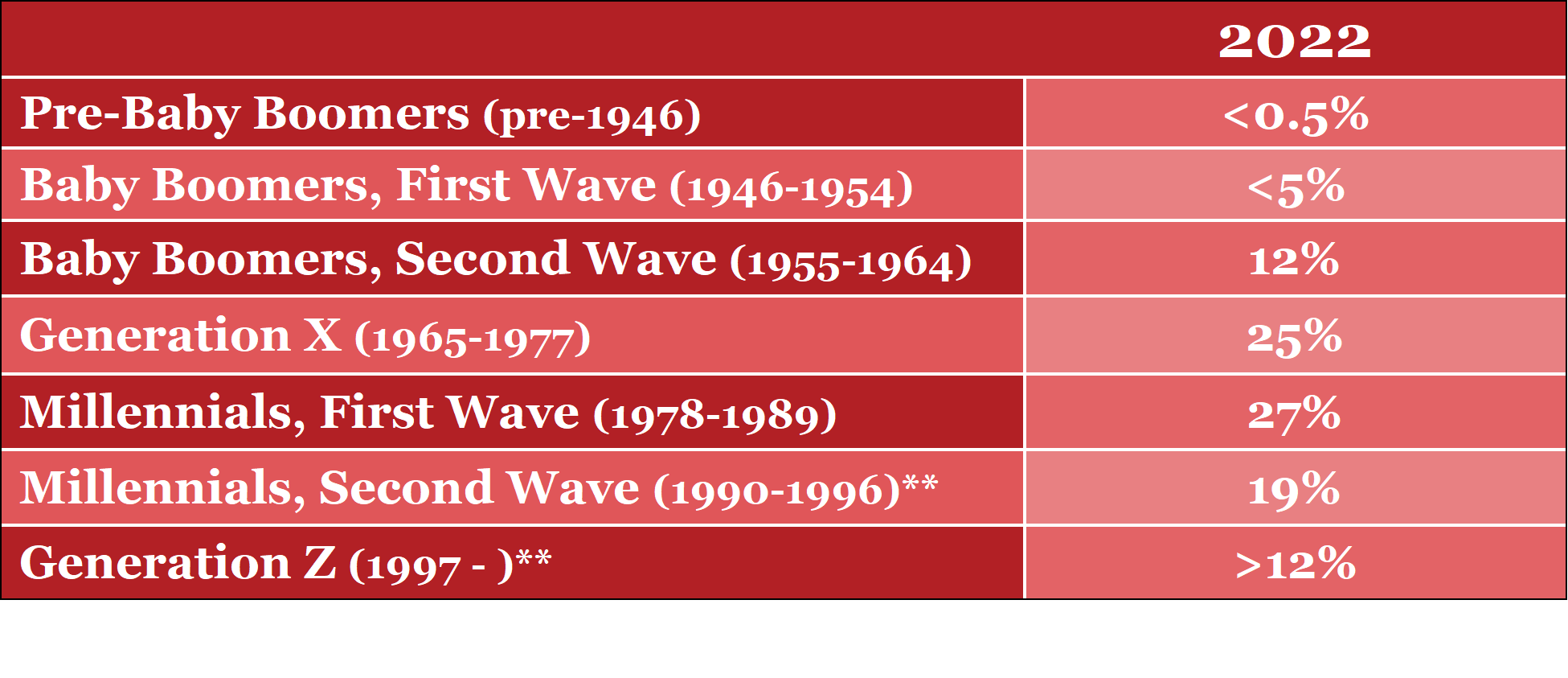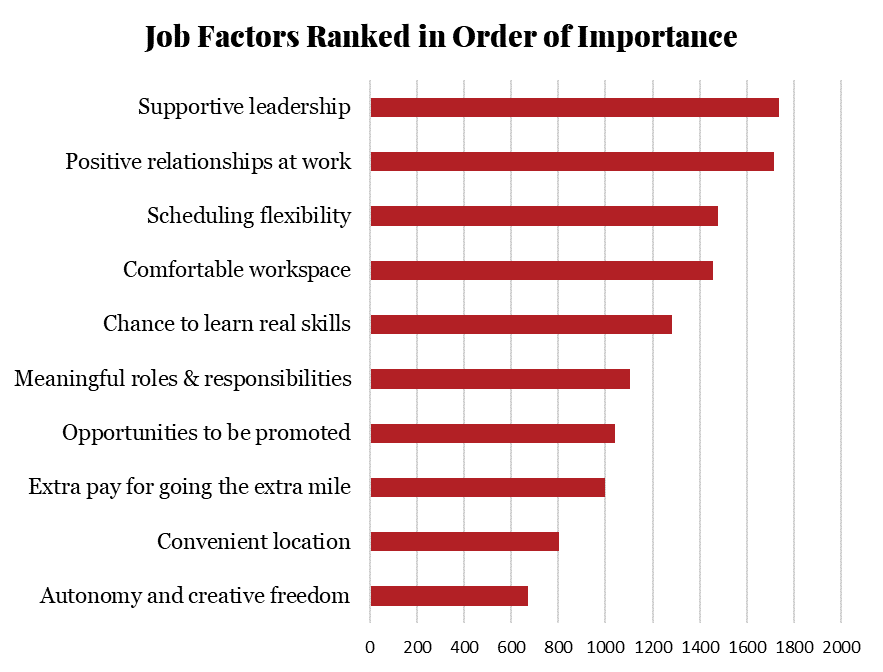Post-pandemic work: What each generation needs for success

If ever there was a generation-defining 'accident of history', the Covid-19 pandemic is it. Compared to other recent accidents of history--the 2008 recession, 9/11, ongoing war--Covid-19 has directly impacted far more people, of all ages, on a global scale. Quite literally, everyone is going through this together.
We are currently experiencing a classic example of a generationally defining event, one that has vastly different ramifications for people depending on their age. The pandemic has disrupted everyone, but those disruptions look very different depending on your current life stage. What does post-pandemic life look like for someone on the verge of retirement, building a family, just entering the workforce, going to school, or born in the midst of it?
There are as many as six generations working side-by-side today:

Employers must begin considering the needs of their people in a post-pandemic world. No, we are not ever going to return to a pre-2020 normal. The new hybrid workforce is here to stay. What that means for each generation is going to be slightly different, based on the life stage during which they experienced this rapid transformation.
Baby Boomers are reinventing retirement
The exodus of the oldest Boomers from the workplace--postponed for several years by the economic crisis that began in 2008--is now swift and steady. And as more Boomers now begin entering traditional retirement age, the pressure is on organizations now more than ever to prepare for the impending loss of the institutional wisdom, knowledge, skills, and relationships those Boomers take with them.
Adding to the problem is this--employers can no longer count on employees to reliably retire at 65.
Whether choosing to retire early as a result of Covid-19, or staying longer to pad their thinned savings, Boomers are contributing to unpredictable employment timelines which make human capital management much more difficult. Adequate succession planning is nearly impossible, making knowledge transfer a hit-or-miss endeavor. People filling the shoes of Boomers often find they are inheriting roles and relationships with little to no context, floundering in a sink-or-swim scenario. Pandemic pressures only compound the issue further.
Boomers in your organization not only need flexible employment accommodations, they need the necessary support to ensure they are either leaving or staying on the best terms. That could mean anything from working less than full-time, partially telecommuting, or working nonexclusively for more than one employer as a contracted employee. It is critical that, no matter the arrangement, Boomers are systematically passing on the knowledge, wisdom, and skills necessary for emerging leaders to be successful.
Gen X doesn't want to be the latchkey kid of your organization
Squeezed on either side by two of the largest generations in history, Gen X has assumed the role of the forgotten 'middle child' in the generational discussion. Employers cannot continue to allow this to be the norm.
The prime age percentage of the workforce is shrinking. More than 50% of today's workforce is younger than Generation X. As the Second Wave Boomers finally begin retiring, Gen Xers will be subject to increasing pressure as the gap in experienced leadership grows in organizations of every size, in all industries.
It is critical that Generation X is not left out of the considerations when it comes to human capital management and resource planning. The responsibilities of wisdom, knowledge, and relationship transfer will, in most cases, fall to Gen Xers. That is, they will become the senior leaders who step up and bridge the gap between retiring Boomers and rising Millennials. They will become the managers and supervisors everyone relies on to meet their needs at work and grow in their careers.
Employers would be wise to avoid the mistake of overlooking the importance of management training and leadership development--the human element matters more than ever in today's workplace. The increasingly interdependent nature of work means effective collaboration and strong leadership are key components of avoiding unnecessary stressors and maintaining work-life balance. That knowledge must be applied to ensure success for emerging Gen X leaders and their generationally diverse teams.
Millennials are adults--treat them like it
The oldest Millennials turn 44 this year. And the youngest Millennials are 26. They are no longer the employees fresh from college or high school, the ones with the least real-world job experience. Clinging to the notion that Millennials--most of whom are now mid-career professionals--are naive or lazy (or eternally 21) isn't doing anyone any favors.
It's time to redefine what it means to be a Millennial at work. While Millennials remain the generation most disproportionately affected by student loan debt and the 2008 financial crisis, they are also the emerging leaders in the workforce. They are the generation that spearheaded the movement toward flexibility and work-life balance, but they are also entering the prime of their careers.
Anyone who continues to complain about the horrors "Millennials" are bringing to the workplace is resisting the reality--the free-agent mindset is the prevailing mindset in the workplace for all employees, especially in a post-pandemic world.
Most workers today assume that employment relationships will be relatively short and transactional. People of all ages and at all levels are free agents today because they have no other choice. So, employers must accept their responsibility in setting people up for success. Adequate growth and training opportunities must not only be there, they must be supported by leaders, managers, and supervisors at all levels.
Gen Z understands the huge importance of the human element
Gen Z is considered by many to be the first generation of true digital natives. Indeed, they were the first generation to not just grow up with the internet, but to never know a world without it. Entire professions that didn't exist just ten years ago are now many young people's dream (or actual!) careers.
But it is a mistake to think that Gen Z is so independent or tech-focused that they no longer seek human connections at work. In our survey of more than 4,000 Gen Zers, Supportive Leadership and Positive Relationships at Work were ranked as the top two most important factors to consider in a job.

Generation Z does not require a radical change in management strategy in order to attract, retain, or engage them. If anything, Gen Z demands that employers commit even more to the fundamentals: meeting regularly one-on-one, coaching performance every step of the way, and supporting ongoing career development.
The bottom line: There is no generational cheat sheet
Why do we continue studying the six generations working side by side today?
Because our research has taught us this: the real punchline of the Great Generational Shift is that employers must rethink human capital management. Gimmicks aren't enough to engage and retain great employees of any age. Back-to-fundamentals leadership is what works.
Because of the incredible pace of change today, younger generations are not "growing up" and "settling down." Rather than younger generations adopting the wisdom of those who came before, older generations are adopting the wisdom and experience of their younger peers. This is because the macro and micro forces driving the pace of change and business environment of the 21st century affect everyone equally.
The real diversity lessons of the Great Generational Shift are these:
- One-size-fits-all doesn't work anymore.
- There are powerful trends impacting everyone of all ages--generations are more "alike" than you may think.
- The key to engaging and retaining the best talent today is to take it one person at a time, one day at a time--situational leadership based on who, why, what, where, and how an individual should be managed in order to do their best work.
We can help set your people up for success.
The generational challenges in each organization are different, just like each person is different.
We can help:
- Learn more about our approach in the Great Generational Shift white paper.
- Or, learn how an organizational assessment or training program can address your unique needs by contacting us.
The post Post-pandemic work: What each generation needs for success appeared first on RainmakerThinking.









